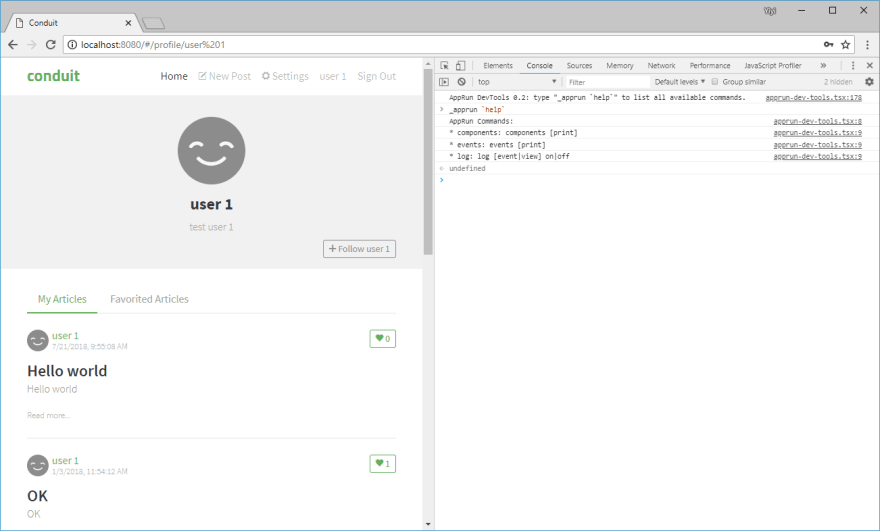AppRun is a Javascript library for building reliable, high-performance web applications using the Elm inspired Architecture, events, and components.
AppRun is a MIT-licensed open source project. Please consider supporting the project on Patreon. 👍❤️🙏
- Write less code
- No proprietary syntax to learn
- Compiler/transpiler is optional
- State management and routing included
- Run side-by-side with jQuery, chartjs, D3, lit-html ...
Application logic is broken down into three separated parts in the AppRun architecture.
- State (a.k.a. Model) — the state of your application
- View — a function to display the state
- Update — a collection of event handlers to update the state
AppRun ties the three parts together and drives the applications. Applications built with AppRun have less lines of code, smaller js files, and better performance. See a comparison from A Real-World Comparison of Front-End Frameworks with Benchmarks (2019 update). You can also see the performance results compared to other frameworks and libraries in the js-framework-benchmark project.
Below is a counter application using AppRun (Online Demo).
<html>
<head>
<meta charset="utf-8">
<title>Counter</title>
</head>
<body>
<script src="https://unpkg.com/apprun@latest/dist/apprun-html.js"></script>
<div id="my-app"></div>
<script>
const state = 0;
const view = state => {
return `<div>
<h1>${state}</h1>
<button >-1</button>
<button >+1</button>
</div>`;
};
const update = {
'+1': state => state + 1,
'-1': state => state - 1
};
app.start('my-app', state, view, update);
</script>
</body>
</html>Using apprun@es6, you can convert AppRun components into web components.(Online Demo)
<html>
<head>
<meta charset="utf-8">
<title>Counter as web component</title>
</head>
<body>
<my-app id='counter'></my-app>
<script src="https://cdnjs.cloudflare.com/ajax/libs/custom-elements/1.1.2/custom-elements.min.js"></script>
<script src="https://unpkg.com/apprun@es6/dist/apprun-html.js"></script>
<script>
class Counter extends Component {
constructor() {
super();
this.state = 0;
this.view = state => `<div>
<h1>${state}</h1>
<button >-1</button>
<button >+1</button>
</div>`;
this.update = {
'+1': state => state + 1,
'-1': state => state - 1
};
}
}
app.webComponent('my-app', Counter);
</script>
</body>
</html>Try the AppRun Playground.
You can include AppRun in your html directly and use it with JavaScript.
<script src="https://unpkg.com/apprun@latest/dist/apprun-html.js"></script>Or you can use AppRun with TypeScript and Webpack. Use the AppRun CLI to initialize a TypeScript and webpack configured project:
npx apprun --init --spa
npm startTo initialize a project that targets ES6/ES2015, use the AppRun CLI with the --es6 flag:
npx apprun --init --spa --es6
npm startAppRun CLI also runs in console.
To use the AppRun dev-tools CLI, include the the dev-tools script.
<script src="https://unpkg.com/apprun@latest/dist/apprun-dev-tools.js"></script>AppRun support the Redux DevTools Extension. To use the dev-tools, install the Redux DevTools Extension. You can monitor the events and states in the devtools.
AppRun has a code snippet extension for VS Code that you can install from the extension marketplace. It inserts AppRun code template for application, component and event handling.
You can launch the webpack dev-server and the demo app from the demo folder with the following npm commands:
npm install
npm startYou can run the unit tests from the tests folder.
npm testUnit tests can serve as functional specifications.
Finally, to build optimized js files to the dist folder, just run:
npm run buildHave fun and send pull requests.
MIT
Copyright (c) 2015-2019 Yiyi Sun





